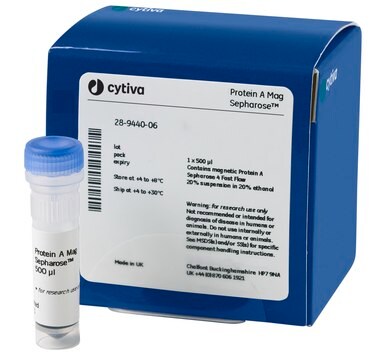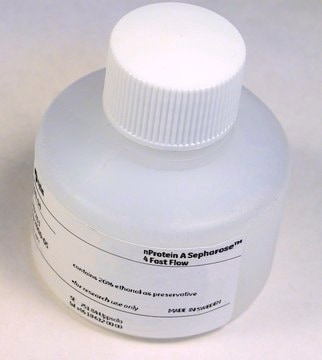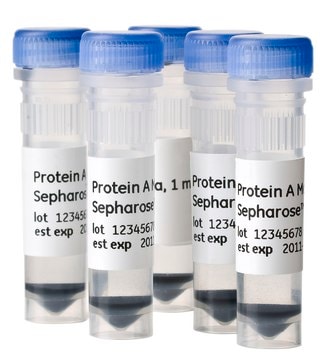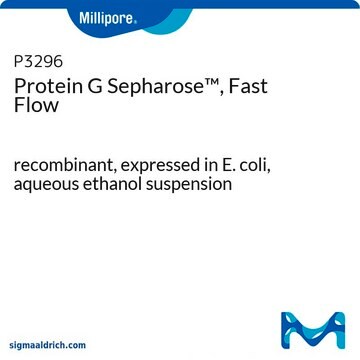GE17-1279-01
rProtein A Sepharose™ Fast Flow
Cytiva 17-1279-01, pack of 5 mL
Synonym(s):
Fast Flow Sepharose, Protein A Sepharose
Sign Into View Organizational & Contract Pricing
All Photos(1)
About This Item
UNSPSC Code:
41106500
NACRES:
NA.56
Recommended Products
ligand
recombinant protein A (E. coli)
packaging
pack of 5 mL
manufacturer/tradename
Cytiva 17-1279-01
storage condition
(20% Ehtanol)
matrix
4% cross-linked agarose
particle size
60-165 μm
average diameter
90 μm (d50v)
cleaning in place
2-11
working range
3-10
capacity
~50 mg binding capacity (human lgG/ml medium)
suitability
suitable for bioprocess medium
storage temp.
2-8°C
Storage and Stability
Please be aware this product may be shipped 90 days before the expiration date. For more information on the batch specific expiration date, please contact technical service.
Analysis Note
To view the Certificate of Analysis for this product, please visit www.cytiva.com.
Legal Information
Sepharose is a trademark of Cytiva
Signal Word
Warning
Hazard Statements
Precautionary Statements
Storage Class Code
3 - Flammable liquids
Certificates of Analysis (COA)
Search for Certificates of Analysis (COA) by entering the products Lot/Batch Number. Lot and Batch Numbers can be found on a product’s label following the words ‘Lot’ or ‘Batch’.
Already Own This Product?
Find documentation for the products that you have recently purchased in the Document Library.
Customers Also Viewed
Fuxiao Wang et al.
Journal of orthopaedic translation, 35, 72-80 (2022-10-04)
Bone fracture healing is a postnatal regenerative process in which fibrocartilaginous callus formation and bony callus formation are important. Bony callus formation requires osteoblastic differentiation of MSCs. The formation of callus was assessed by μCT, Safranin-O, H&E and Masson trichrome
Jeannine A Frei et al.
eNeuro, 8(4) (2021-06-18)
Autism spectrum disorder (ASD) is a neurologic condition characterized by alterations in social interaction and communication, and restricted and/or repetitive behaviors. The classical Type II cadherins cadherin-8 (Cdh8, CDH8) and cadherin-11 (Cdh11, CDH11) have been implicated as autism risk gene
Our team of scientists has experience in all areas of research including Life Science, Material Science, Chemical Synthesis, Chromatography, Analytical and many others.
Contact Technical Service








